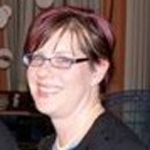Head of Acquisitions, University of Texas Libraries at Austin
 First, tell us a bit about yourself (hometown, current locale, family, hobbies, community involvement?).
First, tell us a bit about yourself (hometown, current locale, family, hobbies, community involvement?).
As an air force brat, I grew up in various places for the first ten years of my life and then my family settled in Texas where I have lived ever since. I enjoy the diversity of Texas and have lived in many different areas in the state but currently reside with my husband in Austin, Texas. We enjoy spending time riding bikes, hiking, and swimming in local springs and rivers. We also enjoy spending time in San Marcos and San Antonio where we have numerous friends.
What is your current job? Describe some of your responsibilities, and how you or your organization fit into the scholarly communications web.
Presently, I’m head of acquisitions at the University of Texas Libraries at Austin and manage a department of twenty-seven people dedicated to the acquisitions and initial management of all resources received by the UT Libraries. The University of Texas is definitely both a producer and consumer of numerous forms of scholarly communication and it is exciting to be part of the environment dedicated to provision of scholarly communication to a wide-range of disciplines.
What career path led to your current position?
I became a librarian thirteen years ago and my first job was as the serials librarian at Texas Southern University in Houston, Texas. From there I moved to a hybrid position at the University of Texas at Arlington as the collections and acquisitions specialist and then became the director, electronic resource programs at the University of Houston before taking my current position. When I first started out in college working as a library assistant, I worked primarily with access control to print serials and have generally followed the evolution of scholarly output throughout my career as a librarian.
Where do you see scholarly communications heading, and what new directions interest you most?
I’m most interested in new models of scholarly communication and the breakdown and decentralization of knowledge distribution as it moves from the journal container into the myriad of representations now made possible through the web environment. It is hard to predict what the eventual outcome of scholarly communication will be in the next ten years but I enjoy following the technological advancements and possibilities of redefining what is meant by scholarly communication.
What advice would you give to people interested in a career in scholarly communications? What new roles or opportunities do you see emerging in the field?
Technological innovation is opening the doors for scholarly communication to be created and distributed in completely new and interesting ways. I advise students at the local I-School to keep an open mind to the possibilities of new forms of communication and collaboration in this environment. Considering how to maintain a record of these new forms of scholarship poses unique challenges and opportunities and is definitely an area to watch and consider various options to these concerns. It is truly an exciting and invigorating time to be involved in the scholarly communications market and there a multiple opportunities to be undertaken as well as fascinating problems to solve as these changes occur.
Profiled May 2009

